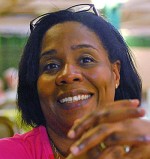Column Name
Title
This summer marks the 50th anniversary of the passage of the Civil Rights Act. To commemorate this historic occasion, the Liberal Arts department created a year’s worth of courses to, as faculty member Renée Marie Baron told The Journal, “enrich students’ academic experience and create what President Polisi calls cross currents with other aspects of their lives as performers.”
Body
Renée grew up in New Rochelle and got her bachelor’s degree from Amherst, her master’s from Yale, and her Ph.D. from George Washington University. She danced, played piano and guitar, and sang in a choir from elementary school through college—just enough background, she said, “to create a genuine appreciation for the arts.” A member of the Juilliard faculty since 2004, Renée has also taught at Howard and Hofstra universities.
Your class was called the Culture of the Civil Rights Movement—what was involved in it?
We investigated the ways in which the movement stemmed from certain aspects of African-American culture. We explored the notions of double consciousness and the politics of respectability, and we also spent time listening to (and singing) freedom songs and their antecedents in both religious and secular contexts. It was a wonderful experience, and that was due largely to the open and honest conversations we were able to have about race, privilege, and identity.
Who was the teacher or mentor who most inspired you when you were growing up?
My grandmother Alexandrine McWilliam inspired me so much—she was a wonderful, nurturing, fashionable lady. She taught me to sew, cook, crochet—anything that would help me learn to take care of myself. She emphasized education and gave me reading assignments during the summer vacations we spent together in her native Trinidad. She taught me how to be my best self—and to make an excellent cup of coffee.
If you could have your students visit any place in the world, where would it be?
I would love for them to visit Trinidad and Tobago. It’s a beautiful country, and the people are just lovely. I would have them spend a Sunday morning at Maracas Beach or any day at Tobago’s Pigeon Point. And Carnival? Nothing better.
What’s the most satisfying aspect of teaching?
I love when students see how what they do in their art relates to the material presented in the liberal arts core and the electives I teach—that is, when they see not that, but how, the liberal arts play a role in their development as artists.
What’s the most frustrating aspect of teaching?
Juilliard students have busier schedules than any other students I have ever taught. Trying to make the most of our time together at certain moments in the semester can be frustrating, but it’s been gratifying though to see all the divisions working together to help work out solutions to this challenge.
Has your teaching changed over the years?
Yes; I started teaching at the university level when I was 25. At the time, I was the “cool,” young instructor! Now, well, now—I am not. On a more serious note, my approach to pedagogy is always evolving because students change from year to year. What works one year with one group doesn’t always work the next. I try to listen out for students’ interests and make connections wherever I can. For example, when I taught at Howard, a historically black college, I used hip-hop—specifically the idea of sampling—to teach students how to integrate sources in a research paper. When I taught at Hofstra, a suburban school, I used the television show C.S.I. to discuss the notion of close reading. In my Writing Seminar class at Juilliard, I invoke sonata form when discussing the elements of a well-crafted essay.
If your students could only remember one thing from your teaching, what would you want it to be?
That I was always excited to see them in class. I love teaching, and I hope they remember that about me.
Who are your favorite authors?
There are so many favorite authors I admire for different reasons: Fitzgerald, Morrison, Baldwin, Kincaid, and Jhumpa Lahiri to name just a few. I read Zadie Smith’s NW last spring, and it was the highlight of my year. In it, northwest London becomes the crossroads of four lives intersecting—brilliant. Since then, I have been pretty much obsessed with Chimimanda Adichie’s novels. Americanah has been my favorite so far, and—even though I know movies are never as good as the novels on which they are based—I can’t wait to see the film adaptation of her Half of a Yellow Sun.
Do you follow any social media?
I’m on Facebook. I try to keep my “friends” manageable—in the land of Facebook, that’s 200! I love that people can share information so easily. Sometimes, I get busy, and I miss a wonderful article in, for example, The New York Times, The Root, or The Huffington Post. When I finally get a minute and go online, there it is—someone I know read it and shared it.
If you suddenly had a few hours of free time, how would you spend it?
I have 5-year-old twins, J. Samantha and Xavier, so I would spend that time sleeping or reading in a coffee shop.
If you weren’t in the career you are in, what would you be doing?
I’d be an archivist. I interned in the archives of New York Public Library’s Schomburg Center for Research in Black Culture and fell in love with organizing and presenting research materials to the public. The wonderful thing about being an academic is that I get to use everything I learned there in my own research.
What would people be surprised to know about you?
I am pretty transparent, so I have no idea.





